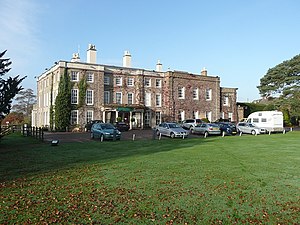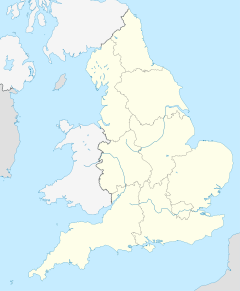Wychnor Hall
| Wychnor Park | |
|---|---|
 Wychnor Park | |
| General information | |
| Town or city | Staffordshire |
| Country | England |
| Coordinates | 52°44′54″N 1°45′39″W / 52.7482°N 1.7607°W |
| Client | The Levett Family |
Wychnor Hall (or Wychnor Park, /ˈwɪtʃnər/) is Grade II Listed early 18th-century country house near Burton on Trent, Staffordshire, formerly owned by the Levett Family. The hall has been converted to a Country Club.
History[edit]
Wychnor takes its name from the Old English meaning 'village on a bank.' Its earliest spelling was Hwiccenofre. Ofre was the Anglo-Saxon word for "edge or bank". Hwicce was a provence comprising Gloucestershire, Worcestershire and a part of Warwickshire and the people were called Hwiccas or Hwicii. It is thought that some of these people came to settle in Wychnor and so gave their name to the place they settled in.[1]
King James I reportedly stayed at the hall in 1621 and 1624.[2]
The present hall dates from the time of Queen Anne but was much altered and extended in the mid 19th century.[3]
There are a number of curious customs associated with Wychnor, at least one of which was said to have begun with Sir Philip de Somerville, who owned the manor of Wychnor in 1338. A flitch of bacon was kept in the hall[4] that could be claimed by anyone who had been married "for a year and a day without quarrelling or repenting; and that if they were then single, and wished to be married again, the demandant would take the same party before any other in the world."[5] Valid claimants being few and far between, the flitch was replaced by a wooden effigy of same, which continued to hang in the hall for many centuries.[6]
Offley family[edit]
In 1661 Wychnor manor was purchased by Mary Offley, widow of John Offley of Madeley. The estate was inherited by her grandson Crewe Offley. He is said to have rebuilt the hall, but died in 1739.[7] He left his real estate to pay all his debts, apart from a property in Chelsea which his elder son John inherited for three years before it reverted to his younger son. The will also contained provisions to protect the younger son's inheritance from his elder brother. .[8] John Offley had been one of the pupils of Samuel Johnson at Edial Hall near Lichfield, and continued to live at Wychnor after his father's death. By 1756 was keeper of his majesty's private roads, gates and bridges, and conductor or guide to his majesty in his royal progresses. In 1765, he sold Wychnor with every article in the house and on the estate, as it was to John Levett.[7]
Levett family[edit]

John Levett, the son of Lichfield politician Theophilus Levett, purchased Wychnor in 1765. John, a landowner, investor and sometime member of the Lunar Society), was Member of Parliament for Lichfield.[citation needed] Though he died childless, Wychnor remained for many years the home of the Levett family.[9][10]
John' s nephew Theophilus Levett was Recorder of Lichfield and High Sheriff of Staffordshire in 1809.[citation needed] His friend General William Dyott, Aide-de-camp to King George III, attended Levett's simple funeral at Wychnor and noted that Levett "has left great riches to his younger children with the exception of his son Arthur, to whom he has bequeathed £4,000."[citation needed]
A second John Levett was High Sheriff of Staffordshire in 1846.[11]
Theophilus John Levett, grandson of the Sheriff of the same name, was M.P. for Lichfield from 1880 to 1885.[citation needed]

Later history[edit]
The Levett family held Wychnor Hall until 1913, when it was sold to Lt.-Col. W.E. Harrison, of a family who had mining interests around Cannock, in the West Midlands.[12] The estate was broken up and sold piecemeal in 1976 and the Hall and its immediate grounds passed through various owners, being converted into the Wychnor Park Country Club after 1981.[13]
See also[edit]
References[edit]
- ^ Harrison, Edith (1934). The Story of Wychnor ... Written for the school children of Wychnor. pp. 9–10.
- ^ A Topographical History of England (1848) Samuel Lewis p. 564 from British History Online
- ^ Lichfield.), Alfred Williams (of (1 January 1899). "Mansions and Country Seats of Staffordshire and Warwickshire: A Series of Descriptive Articles". F. Brown – via Google Books.
- ^ Handbook for Travellers in Derbyshire, Nottinghamshire, Leicestershire, and Staffordshire. J. Murray. 1 January 1874. p. 170 – via Internet Archive.
r. t. k. levett.
- ^ Sheffield.), William White (of (1 January 1834). "History, Gazetteer, and Directory of Staffordshire: And the City and County of the City of Lichfield, Comprising ... a General Survey of the County of Stafford and the Diocese of Lichfield & Coventry; with Separate Historical, Statistical, & Topographical Descriptions of All the Boroughs, Towns, Parishes, Villages, Hamlets, Manors, and Liberties, in the Five Hundreds of the Shire ... by William White". author – via Google Books.
- ^ GENUKI. "Genuki: Wychnor, Staffordshire".
- ^ a b Sampson Erdeswick (1844). A survey of Staffordshire, containing the antiquities of that county, collated with manuscript copies and with additions and corrections. J. B. Nichols. p. 322. Retrieved 2 January 2019.
- ^ "OFFLEY, Crewe (1682-1739), of Wichnor, Staffs". History of Parliament Online (1690-1715). Retrieved 8 January 2019.
- ^ History of Wychnor, A Survey of Staffordshire: Containing the Antiquities of that County, Sampson Erdeswicke, 1820.
- ^ Erdeswicke, Sampson; Harwood, Thomas (1 January 1820). A survey of Staffordshire, with a description of Beeston-castle in Cheshire. To which are added some Observations upon the possessors of monastery-lands in Staffordshire, by sir S. Degge. Collated with MS. copies, and with additions and corrections, by Wyrley [and others] by T. Harwood. p. 238 – via Internet Archive.
john levett knt.
- ^ "Annual Register". J. Dodsley. 1 January 1847 – via Google Books.
- ^ Museum, Durham Mining. "Durham Mining Museum - W. E. Harrison, Lt.-Col., O.B.E., D.L., J.P., C.C."
- ^ http://lesleyscoffeestop.blogspot.com/2012/08/the-history-of-wychnor-hall.html; account believed based on material distributed to guests staying at the Wychnor Park Country Club
External links[edit]
- Historic England. "Wychnor Hall (1038441)". National Heritage List for England.
- Burkes Genealogical and Heraldic Dictionary of the Landed Gentry of Great Britain and Ireland, Part 2 (1863) p. 869.
- Levett Family Papers. Staffordshire Archive Service, Lichfield Record Office
- Mansions and Country Seats of Staffordshire and Warwickshire, Alfred Williams, 1899 Wichnor Park
- John Levett, Wychnor Park, The Scots Peerage, James Balfour Paul, Edinburgh, 1905
Further reading[edit]
- The Lunar Men: Five Friends Whose Curiosity Changed the World, Jenny Uglow, Farrar, Straus & Giroux, New York, 2002 (see John Levett, MP)


